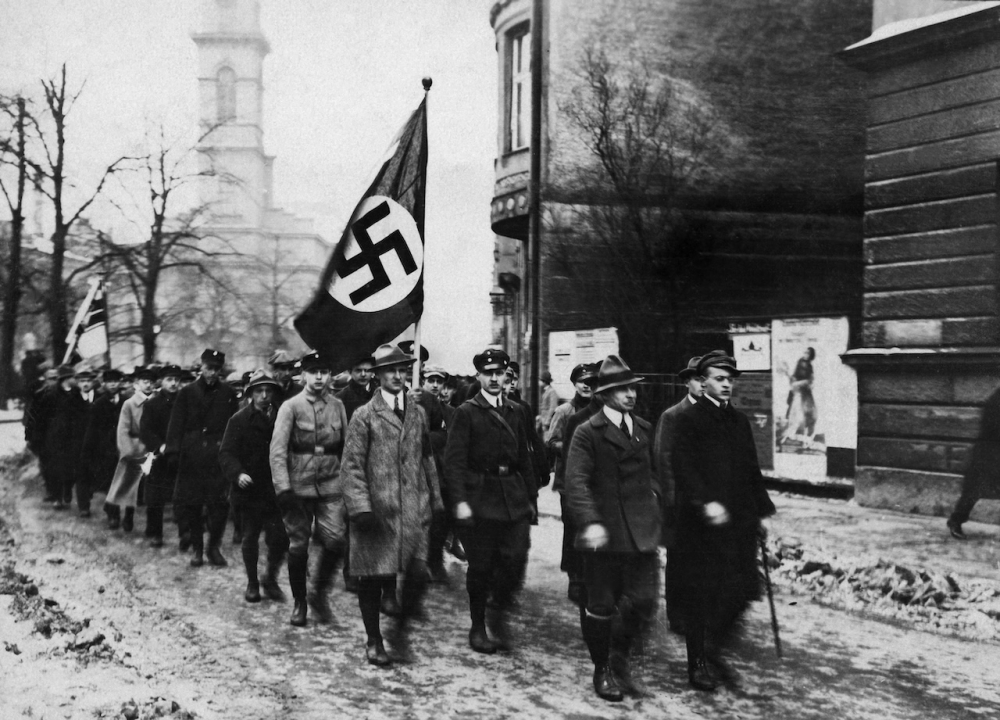
by Andrew Nagorski
Winthrop Bell, a British subject born and raised in Halifax, Nova Scotia, was studying philosophy in the German university town of Göttingen in 1914 when World War I trapped him there. Detained as an enemy alien, he was nonetheless allowed to defend his dissertation (which he had written in German) with three of his professors questioning him in his cell. As Jason Bell writes in “Cracking the Nazi Code,” this amounted to “one of the most unorthodox doctoral defences in history.”
Though he shares a surname with his subject, the author is not related to Winthrop Bell. He is, however, a philosopher as well, teaching at the University of New Brunswick. In “Cracking the Nazi Code,” Mr. Bell offers a deeply researched, intriguing portrait of Winthrop. After emerging from four years of largely genteel captivity in Germany, the young scholar was recruited in London by Britain’s nascent Secret Intelligence Service, or SIS (the department later known as MI6). As his biographer puts it: “In 1918, no Briton knew more about Germany than Bell.”
SIS quickly dispatched Winthrop, under cover as a Reuters correspondent, back to Germany, which was attempting to reinvent itself as a liberal democracy. His mission, as he saw it, was to help his German friends who supported that goal—and to warn the victorious powers of the sinister forces seeking a very different postwar outcome. He dined with top officials and businessmen and dodged bullets during Berlin street battles between extremists of the left and right.
Winthrop’s career in the next few years included stints as a philosophy professor at Harvard and businessman in Nova Scotia before he embarked on more intelligence gathering in Germany during Hitler’s rise in the 1930s. It is a remarkable story, but until Mr. Bell received permission to examine Winthrop’s papers, which had been under government seal, his story was not so much forgotten as unknown. The author, who spent 15 years on his research, argues that his subject was a super-spy who “led the fight” against the Nazis, both in their early days and on the eve of World War II.
Given his admiration for Winthrop, Mr. Bell’s sweeping assertions are understandable, although hardly indisputable. He rightly emphasizes how blind most of the world was to the magnitude of the threat emerging in Germany. (Full disclosure: He quotes my book “Hitlerland” to buttress this point.) He also highlights Winthrop’s prescience about Hitler’s genocidal ambitions against both Jews and other non-Aryans. The agent reported that the German leader saw mass murder not as “a dream for some vague future” but as an “immediate practical project.”
Most of “Cracking the Nazi Code” focuses on the immediate aftermath of World War I, when Winthrop lobbied for the Allies to ease up on their rush to punish Germany. He did so openly as a journalist filing impassioned stories about the threat of mass starvation and covertly in his SIS role. Mr. Bell credits his subject with playing a major role in persuading the Allies to lift their food blockade of Germany in March 1919.
But Winthrop was hardly the only observer who pointed out the disastrous economic conditions that were fueling massive unrest in Germany. (John Maynard Keynes, for one, blasted the harsh terms imposed by the Treaty of Versailles in his 1919 book, “The Economic Consequences of the Peace.”) Winthrop presented to his British handlers an alternate strategy, in which an energetic financial rescue plan would shore up Germany’s fledgling democratic institutions. His recommendations, though, remained buried in reports that his bosses refused to declassify for publication, restricting much of Winthrop’s output to a small circle of senior officials in Britain and Canada.
Winthrop also warned about the growing power of the Freikorps, the paramilitary units that were precursors to Hitler’s storm troopers, with similar racist credos. A key figure in the rising extremist right was Gen. Erich Ludendorff, who promoted the “stab-in-the-back” theory, claiming that it was the politicians, not military commanders like himself, who were responsible for Germany’s defeat. As early as 1919, Mr. Bell writes, “the Nazis’ power was already astounding.” Winthrop reported that they could take over the country any day they wanted.
But this version of events conflates the tiny German Workers’ Party that was founded that year with a broad array of far-right forces. In 1920, it was renamed the National Socialist German Workers’ Party, and Adolf Hitler soon took over as its leader. He echoed Ludendorff’s stab-in-the-back rhetoric and welcomed the general’s support. However, as demonstrated by their abortive Beer Hall Putsch in 1923 and Hitler’s subsequent arrest, at that point the Nazis were hardly an unstoppable national movement.
Despite his overestimation of the Nazis’ initial capabilities, Winthrop maintained that there was nothing inevitable about their rise to power. He argued that if Germany could achieve economic stability, with strong support from its former enemies, the domestic extremists would be contained. During the mid-1920s, such an outcome looked quite plausible. It would take the global fallout from the 1929 stock-market crash to turbo-charge Hitler’s movement.
Winthrop didn’t read Hitler’s infamous autobiographical screed, “Mein Kampf,” until early 1939. Yet, when he did, Mr. Bell asserts, the agent deciphered the book’s “hidden message,” which was that “the Austrian meant to kill all the non-Aryans in the entire world.” Most people found that too preposterous to believe—but not everyone. As early as 1933, when Quentin Reynolds of the International News Service arrived in Berlin, H.R. Knickerbocker, a fellow American correspondent, immediately urged him to read “Mein Kampf,” since “it’s all there.”
Mr. Bell has done yeoman’s work unearthing Winthrop’s story. The British agent was not the only person who got Hitler mostly right, but he was one of the earliest to do so.
Mr. Nagorski is the author, most recently, of “Saving Freud: The Rescuers Who Brought Him to Freedom.”









